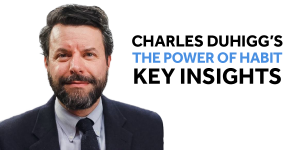
Insight 4


Some habits require an extra element: belief.
“If you identify the cues and rewards you can change the routine. At least, most of the time. For some habits, however, there’s one other ingredient that’s necessary: belief.”
Tony Dungy, coach of the Colts, had worked years to get a head coaching job for the NFL. Four times he had interviewed for a job and each time he had been rejected.
Dungy was a firm believer in habits. He believed that the best players were the ones that reacted the fastest, not just those that were the best. This, to a point, helped his team. However, he found that in clutch game times, the players would doubt what they had learned and revert to old habits.
Alcoholics Anonymous provides a support system for members to build new habits. Its built-in social system gives alcoholics the same routines and rewards they would get at a bar, but without the booze. Alcoholics did not necessarily crave the effects of alcohol, but rather the escapism or social rewards. AA helps shift that routine, helping drinkers identify their triggers so that they can replace their habits.
The problem with both alcoholics and NFL stars is that even new habits often falter in times of stress. Science shows that even when cravings produced by the brain are manually overridden, addicts will still default to their former behaviors. The reason, scientists discovered, is that in order to sustain habits through times of stress, belief is needed.
It was the death of Dungy’s son that allowed the Colts to believe in themselves enough to win the Super Bowl. The overwhelming desire to coalesce around their coach allowed them to fully give into the habits he had taught them, and inspired the team to fully click. In the case of John, an atheist AA member, it was the belief of the AA community that allowed him to stick with his new habits. “At some point, people in AA look around the room and think, if it worked for that guy, I guess it can work for me,” said Lee Ann Kaskutas, a senior scientist at the Alcohol Research Group. “There’s something really powerful about groups and shared experiences. People might be skeptical about their ability to change if they’re by themselves, but a group will convince them to suspend disbelief. A community creates belief.”
“These kinds of information networks can do a masterful job of tapping both individual and collective intelligence: the individual employee has a provocative and useful hunch, and the group helps complete the hunch by connecting it to other ideas that have circulated through the system, and helps separate out that hunch from the thousands of other less useful ones by voting it to the top of the charts. By making the ideas public, and by ensuring that they remain stored in the database, these systems create an architecture for organizational serendipity. They give good ideas new ways to connect.”
“By putting alcoholics in meetings where belief is a given – where, in fact, belief is an integral part of the twelve steps – AA trains people in how to believe in something until they believe in the program and themselves. It lets people practice believing that things will eventually get better until things actually do.”
VIDEO 4: Watch Charles talk about how Alcoholics Anonymous helps even atheists build the belief required to beat their addictions.